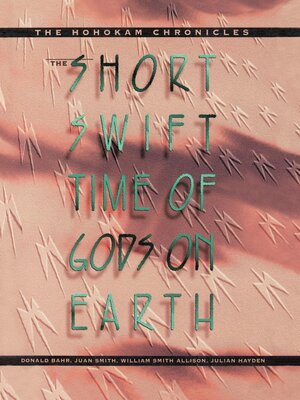
Sign up to save your library
With an OverDrive account, you can save your favorite libraries for at-a-glance information about availability. Find out more about OverDrive accounts.
Find this title in Libby, the library reading app by OverDrive.



Search for a digital library with this title
Title found at these libraries:
| Library Name | Distance |
|---|---|
| Loading... |
In the spring of 1935, at Snaketown, Arizona, two Pima Indians recounted and translated their entire traditional creation narrative. Juan Smith, reputedly the last tribesman with extensive knowledge of the Pima version of this story, spoke and sang while William Smith Allison translated into English and Julian Hayden, an archaeologist, recorded Allison's words verbatim. The resulting document, the "Hohokam Chronicles," is the most complete natively articulated Pima creation narrative ever written and a rare example of a single-narrator myth.
Now this extraordinary work, composed of thirty-six separate stories, is presented in its entirety for the first time. Beautifully expressed, the narrative constitutes a kind of scripture for a native church, beginning with the creation of the universe out of the void and ending with the establishment in the sixteenth century of present-day villages. Central to the story is the murder/resurrection of a god-man, Siuuhu, who summoned the Pimas and Papagos (Tohono O'odham) as his army of vengeance and brought about the conquest of his murderers, the ancient Hohokam.
Donald Bahr extensively annotates the text and supplements it with other Pima-Papago versions of similar stories. Important as a social and historic document, this book adds immeasurably to the growing body of Native American literature and to our knowledge of the development of Pima-Papago culture.
In the spring of 1935, at Snaketown, Arizona, two Pima Indians recounted and translated their entire traditional creation narrative. Juan Smith, reputedly the last tribesman with extensive knowledge of the Pima version of this story, spoke and sang while
Now this extraordinary work, composed of thirty-six separate stories, is presented in its entirety for the first time. Beautifully expressed, the narrative constitutes a kind of scripture for a native church, beginning with the creation of the universe out of the void and ending with the establishment in the sixteenth century of present-day villages. Central to the story is the murder/resurrection of a god-man, Siuuhu, who summoned the Pimas and Papagos (Tohono O'odham) as his army of vengeance and brought about the conquest of his murderers, the ancient Hohokam.
Donald Bahr extensively annotates the text and supplements it with other Pima-Papago versions of similar stories. Important as a social and historic document, this book adds immeasurably to the growing body of Native American literature and to our knowledge of the development of Pima-Papago culture.
In the spring of 1935, at Snaketown, Arizona, two Pima Indians recounted and translated their entire traditional creation narrative. Juan Smith, reputedly the last tribesman with extensive knowledge of the Pima version of this story, spoke and sang while







